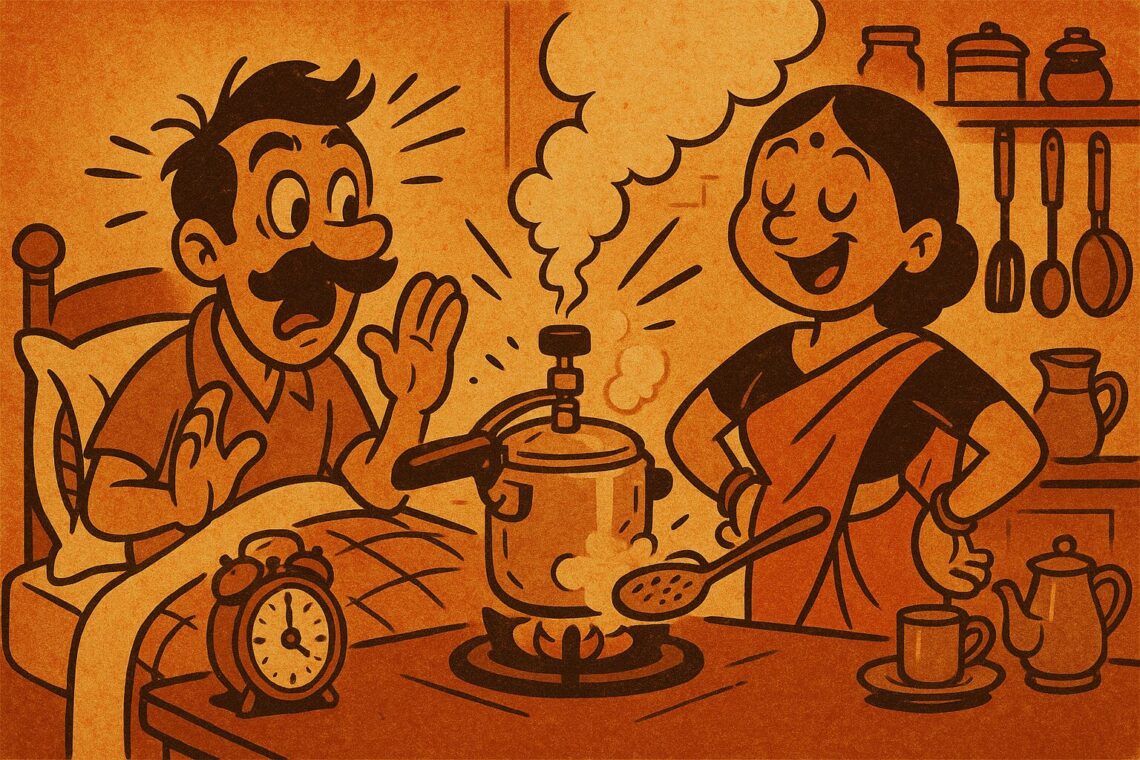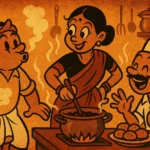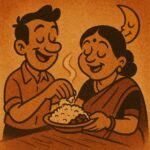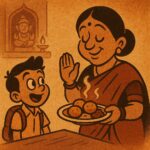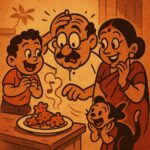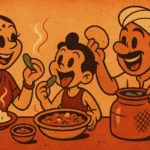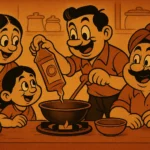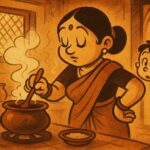The first sound that greets me every morning isn’t the sharp ring of an alarm clock or the hum of my phone vibrating with notifications. No, it’s something far more comforting and, in its own way, more authoritative: the whistle of the pressure cooker. It’s that unmistakable *psssss* sound that cuts through the quiet morning air, signaling the beginning of the day. As the steam escapes, so does the sense of calm that has been lingering in the house, inviting the start of whatever comes next. It’s the sound that marks my transition from sleep to the rhythm of the everyday.
Back in Mumbai, this sound wasn’t just a noise—it was a part of the choreography of the morning, one that tied my routine to my family, to the very essence of my cultural rhythm. In our small flat, the pressure cooker was like the heartbeat of the house. My mother, expertly handling the morning cooking, would time the whistles just right. In between, there’d be the faint clink of metal spoons, the scent of turmeric wafting through the air, and the soft murmur of family members getting ready for the day. Even now, in my apartment in Austin, that sound still triggers something deep within me, connecting me to that world of simple yet profound daily rituals.
The Ritual of Morning Cooking
Chai comes first, of course—always the first cup, always the same way, just like it was in my childhood. But the pressure cooker is what carries the weight of the meal. Whether it’s dal or rice, or perhaps the occasional batch of sambar or khichdi when things need to be simple, the pressure cooker takes the center stage. There’s something hypnotic about it, isn’t there? The soft hiss of steam gradually rising as the cooker comes to life, almost as if it’s waking up with you. And before you know it, that’s the sign that breakfast, or lunch prep, or the meal for the day is officially underway.
It’s a sound that promises the arrival of something comforting. Growing up, I’d often be in the other room, rushing through my morning routine, but no matter how far I was, the sound of the pressure cooker would always pull me back to the kitchen, like a subtle invitation to a moment of home. It was my mother’s way of letting me know she had things under control. In that moment, I didn’t need to ask what was cooking—I knew it would be something nourishing, something hearty, something that would make me feel safe and grounded. The pressure cooker became my reminder that even on the busiest mornings, there was always something stable to rely on.
Food as Time Keeper
That whistling sound is more than just a cue to start cooking—it’s a marker of time, one that’s deeply embedded in my daily flow. It’s the sound that heralds the beginning of the day, setting the pace for everything that follows. In Mumbai, it was never just about what was in the cooker; it was about the timing, the rhythm. The first whistle would send us all into motion, signaling the moments when you needed to move, when you needed to prepare. It was like a dance that we all moved through, with the pressure cooker as the conductor.
Living in Austin, I’ve often found myself without that sound. It was strange at first, having to wake up to something more conventional, like an alarm clock or a phone buzzing. But as I adjusted, I realized how much I missed it—the way it was more than just a cue to cook; it was a reminder of how food, at its most basic, can provide structure to our lives. My mornings now start with the beep of my alarm, but I often find myself longing for that whistling sound that once framed my day. And so, in my own kitchen now, I make sure to keep the ritual alive. I let the pressure cooker whistle, not just for the food that will come out of it, but for the space it creates in my life, that feeling of being anchored to something familiar, something comforting.
From Morning Chai to Midnight Leftovers
What’s interesting about this daily rhythm is that it doesn’t stop with the pressure cooker. It flows throughout the day, like a subtle current beneath everything else. From the first chai in the morning to the late-night leftovers that somehow taste even better than they did the night before, food anchors the everyday. The smell of curry simmering, the sound of rice being rinsed, the sizzle of vegetables hitting hot oil—these sensory markers create a timeline, a rhythm to my days that’s as predictable as it is comforting.
And when it comes to leftovers, there’s something about the late-night hour that makes food feel like a final act of the day. After a long day of work, when everything else feels chaotic, the quiet ritual of reheating food becomes a small but profound act of self-care. The pressure cooker might have played its role in the morning, but now it’s the leftovers that act as the final note in the day’s melody. It’s the same food, but somehow, it tastes even better, as though it has been marinated by time and reflection. It’s a meal that carries the weight of everything that came before it—the busy day, the rush of work, the conversations that filled the air.
Choreography of Cooking: Finding Flow in the Ordinary
The beauty of it all lies in the choreography of cooking. It’s more than just following a recipe—it’s a dance of sorts, one that begins with the first chai of the day and ends with the comforting sigh of leftover food. In between, there’s the chopping, the stirring, the simmering, all moving in a synchronized flow that guides me through the day. Even in the chaos of life, food gives me something predictable to hold onto. The pressure cooker might only whistle for a minute or two, but in that time, I’m reminded of the larger rhythm at play—the rhythm of daily life, of family, of tradition, and of the simple joy of cooking food that nourishes the body and the soul.
In the end, food isn’t just about what we eat; it’s about how we move through our days, how the little rituals—like the morning pressure cooker whistle—shape our lives and our sense of time. And as I sit here, sipping my morning chai in my Austin kitchen, I realize that while the pressure cooker might not always whistle in the same way, the rhythm of it all is still with me. Food continues to anchor me, to remind me that no matter where I am, there’s always a small ritual waiting for me to start my day.
The Quiet Rituals That Anchor Us
In the end, these quiet rituals—the morning chai, the pressure cooker whistle, the late-night leftovers—are the ones that hold our days together. They might not seem like much, but they create a framework for everything that follows. Food becomes our rhythm, the constant thread that runs through our routines, reminding us that no matter how chaotic life gets, there’s always something simple and comforting to hold on to. And for that, I’ll always be grateful—for the sound of the pressure cooker, for the comforting taste of chai, and for the everyday rituals that anchor me in this busy world.
Born in Mumbai, now stir-frying feelings in Texas. Writes about food, memory, and the messy magic in between — mostly to stay hungry, sometimes just to stay sane.

